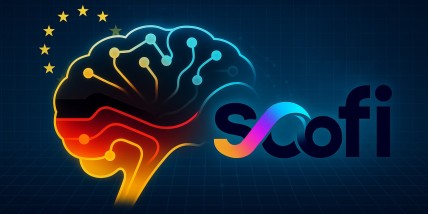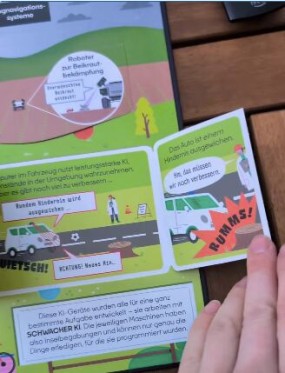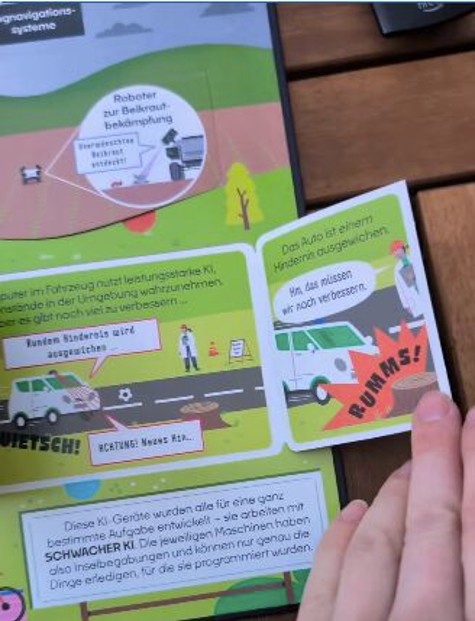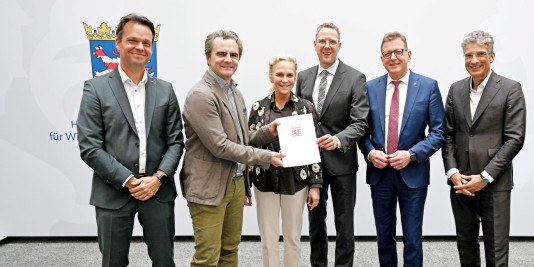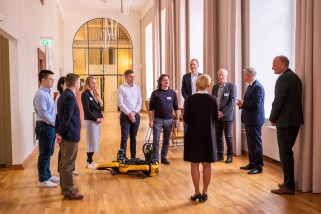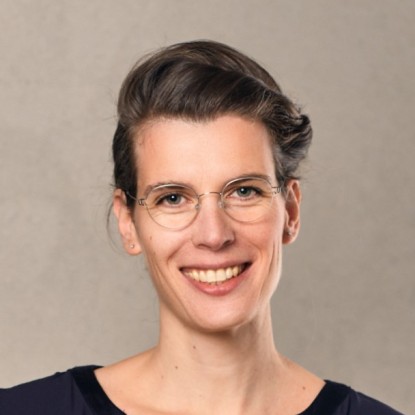-
![]() Bild: KI generiert mit ChatGPT
Bild: KI generiert mit ChatGPT![]() Bild: KI generiert mit ChatGPT
Bild: KI generiert mit ChatGPTProjekt SOOFI stärkt europäische KI-Souveränität
2025/11/27
Offenes KI-Grundlagenmodell für die industrielle Anwendung entsteht
Europa verfügt bislang über kein eigenes offenes Basis-Sprachmodell für anspruchsvolle industrielle KI-Anwendungen. Viele Unternehmen greifen deshalb auf Systeme aus den USA oder Asien zurück. Das neue EU-Projekt SOOFI soll diese Abhängigkeiten verringern und eine verlässliche technologische Grundlage für die Industrie schaffen. Von der TU Darmstadt ist das Fachgebiet von Informatik-Professor Kristian Kersting beteiligt. Das Bundeswirtschaftsministerium fördert das Projekt mit 20 Millionen Euro.
-
![]() Bild: Kristian Kersting
Bild: Kristian Kersting![]() Bild: Kristian Kersting
Bild: Kristian KerstingKinder-Sachbuch „Ich weiß mehr! – Künstliche Intelligenz" ausgezeichnet
2025/11/27
Fachliche Begleitung der deutschen Übersetzung durch KI-Experte Prof. Kristian Kersting
Das Kinder-Sachbuch „Ich weiß mehr! – Künstliche Intelligenz. Wie Maschinen lernen und wofür das gut ist“ ist Preisträger des Jugend-Sachbuch-Preises 2025 in der Kategorie MINT. Die deutsche Ausgabe in der Übersetzung von Jutta Vogt wurde fachlich von Kristian Kersting, Informatikprofessor an der TU Darmstadt, begleitet.
-
![]()
![]()
DFKI-Labor an der TU Darmstadt wird dauerhafter Standort
2025/11/03
Land Hessen fördert herausragende KI-Forschung mit weiteren 9,4 Millionen Euro
Wissenschaftsstaatssekretär Christoph Degen hat heute (3. November) gemeinsam mit Digitalstaatssekretär Stefan Sauer und Wirtschaftsstaatssekretärin Ines Fröhlich in Wiesbaden einen Förderbescheid über 9,4 Millionen Euro an das Deutsche Forschungszentrum für Künstliche Intelligenz (DFKI) überreicht. Das DFKI hat 2022 an der TU Darmstadt ein KI-Labor eingerichtet. Mit Unterstützung des Landes wird das Labor nun in einen dauerhaften Standort umgewandelt. Das Geld stammt aus dem Digitalisierungsbudget des Hessischen Ministeriums für Digitalisierung und Innovation. Das hessische Wissenschaftsministerium betreut die Einrichtung.
-
![]()
![]()
TU-Informatikerin Georgia Chalvatzaki mit Alfried Krupp-Förderpreis ausgezeichnet
2025/10/29
Feierliche Übergabe in der Villa Hügel
Die Alfried Krupp von Bohlen und Halbach-Stiftung hat die Informatikerin Prof. Dr. Georgia Chalvatzaki mit dem Alfried Krupp-Förderpreis 2025 ausgezeichnet – einer der bedeutendsten wissenschaftlichen Auszeichnungen in Deutschland. Die 37-Jährige ist seit 2023 Professorin für Interaktive Roboterwahrnehmung und Lernen am Fachbereich Informatik der Technischen Universität Darmstadt. Dem Auswahlgremium der Alfried Krupp von Bohlen und Halbach-Stiftung hatten insgesamt 42 Kandidatenvorschläge aus ganz Deutschland vorgelegen.
-
![Hände tippen auf einer Laptop-Tastatur, auf dem Bildschirm steht „AI“ über einer Suchleiste mit dem Textanfang „Create a“.]() Bild: terovesalainen - stock adobe.com
Bild: terovesalainen - stock adobe.com![Hände tippen auf einer Laptop-Tastatur, auf dem Bildschirm steht „AI“ über einer Suchleiste mit dem Textanfang „Create a“.]() Bild: terovesalainen - stock adobe.com
Bild: terovesalainen - stock adobe.comText-zu-Bild Generatoren reproduzieren und verstärken Rollenbilder
2025/10/23
Stärke von Geschlechterstereotypen in KI-Bildern variiert je nach Sprache
Forschende der Technischen Universität Darmstadt und der Technischen Universität München (TUM) haben untersucht, wie Text-zu-Bild-Generatoren in verschiedenen Sprachen mit Geschlechterrollen umgehen. Die Ergebnisse zeigen, dass die Modelle Geschlechterstereotype nicht nur abbilden, sondern sie sogar verstärken. Die Richtung und Stärke der Verzerrung sind dabei abhängig von der jeweiligen Sprache.
-
![]()
![]()
So versteht KI ganze Sätze
2025/10/22
UKP Lab überträgt Weiterentwicklung von Sentence Transformers an Hugging Face
Das Ubiquitous Knowledge Processing (UKP) Lab der Technischen Universität Darmstadt hat die Wartung und Weiterentwicklung von Sentence Transformers, einer der weltweit meistgenutzten Open-Source-Bibliotheken für semantische Embeddings, offiziell an die Plattform Hugging Face übertragen. Die Open-Source-Software ging 2019 aus der Forschung am UKP Lab hervor und hat sich seither als eine der wichtigsten Ressourcen für Künstliche Intelligenz (KI) in der Sprachverarbeitung (Natural Language Processing, kurz NLP) etabliert. Sie ermöglicht es, ganze Sätze so darzustellen, dass Computer deren Bedeutung erfassen und vergleichen können.
-
![Das Team von Energy Robotics bei einer Präsentation im Wissenschaftsschloss]() Bild: Tessa Scheufler
Bild: Tessa Scheufler![Das Team von Energy Robotics bei einer Präsentation im Wissenschaftsschloss]() Bild: Tessa Scheufler
Bild: Tessa ScheuflerTU-Spin-Off “Energy Robotics” erhält 13,5 Mio. US-Dollar Finanzierung
2025/10/15
Skalierung der KI-basierten Plattform für autonome Inspektionen in Energie-, Chemie-, Industrie- und Sicherheitsumgebungen
Das Darmstädter Deep-Tech-Start-up „Energy Robotics“ hat eine Series-A-Finanzierungsrunde in Höhe von 13,5 Millionen US-Dollar abgeschlossen. Co-Lead-Investoren sind Blue Bear Capital und Climate Investment (CI).
-
![Andres Goens, Informatikprofessor an der TU Darmstadt]() Bild: Patrick Bal
Bild: Patrick Bal![Andres Goens, Informatikprofessor an der TU Darmstadt]() Bild: Patrick Bal
Bild: Patrick BalNeu am Fachbereich: Professor Andrés Goens
2025/10/14
Programmiermethoden für zuverlässige verteilte Software
Zum 1. Oktober hat Professor Andrés Goens seine Professur am Fachbereich Informatik der TU Darmstadt angetreten. Der 35-Jährige, der zuvor eine Assistenzprofessur an der Universität Amsterdam innehatte, forscht hier zu Programmiermethoden für zuverlässige verteilte Software. Der wichtigste wissenschaftliche Meilenstein bislang: Das Problem der Speichermodelle für heterogene Hardware genau zu beschreiben und eine Teillösung gefunden zu haben. Zum Auftakt hat er einige Fragen beantwortet.
-
![]() Picture: Bild: TU Darmstadt/KI-generiert
Picture: Bild: TU Darmstadt/KI-generiert![]() Picture: Bild: TU Darmstadt/KI-generiert
Picture: Bild: TU Darmstadt/KI-generiertAI with Confidentiality
2025/10/13
Use of Artificial Intelligence in the Diagnosis and Treatment of Mental Disorders
Researchers led by Computer Science Professor Iryna Gurevych at TU Darmstadt and the Indian Institute of Technology (IIT) Delhi are addressing a key question: How can AI-based tools in the mental health domain be designed to reliably protect patient privacy? In a new study published in Nature Computational Science, they present a roadmap for developing support systems that improve diagnosis and therapy while safeguarding sensitive information. The researchers emphasize that privacy is a key prerequisite for using AI in mental health care.
-
![]() Bild: Klaus Mai
Bild: Klaus Mai![]() Bild: Klaus Mai
Bild: Klaus Mai„Ein Sportwagen zum halben Preis“
2025/09/23
TU-Professor Kersting ordnet die Bedeutung des KI-Sprachmodells DeepSeek-R1 ein
TU-Professor Kersting ordnet die Bedeutung des KI-Sprachmodells DeepSeek-R1 ein
Computer Science

Artificial Intelligence
Research News from the Department of Computer Science
Artificial Intelligence
Research News from the Department of Computer Science

